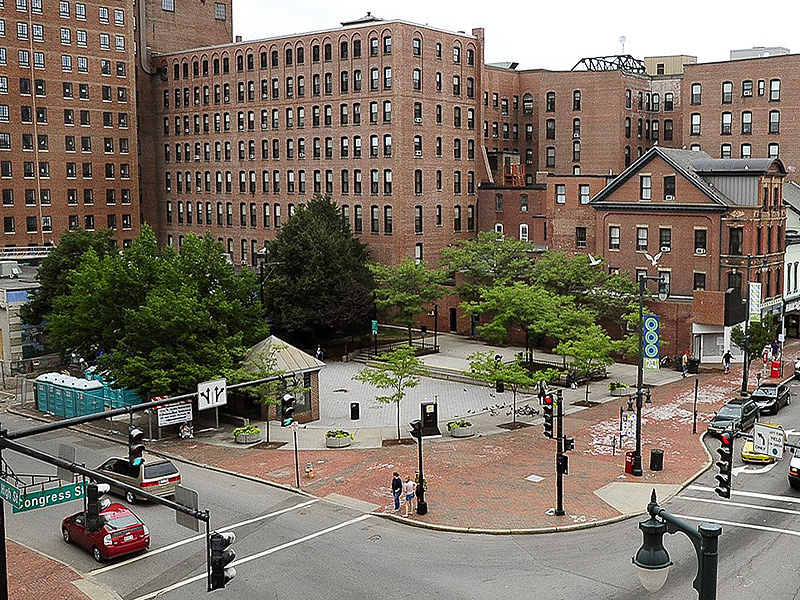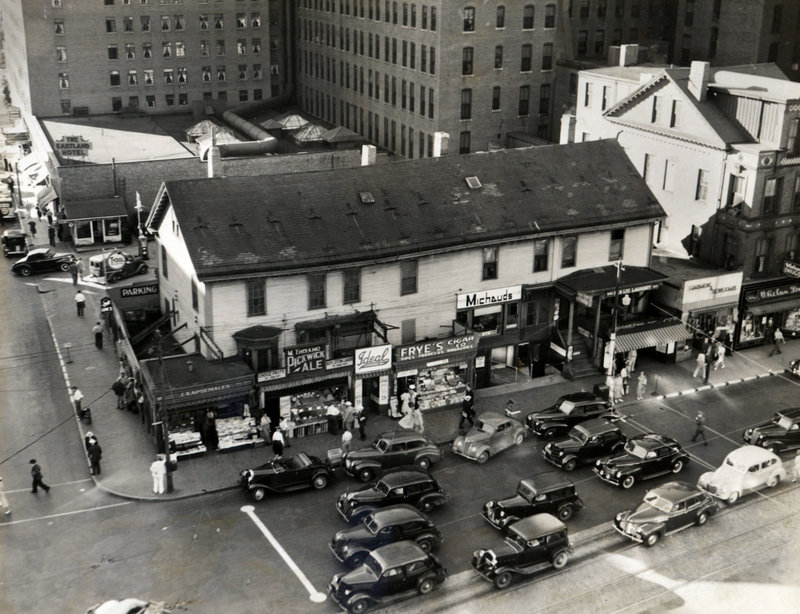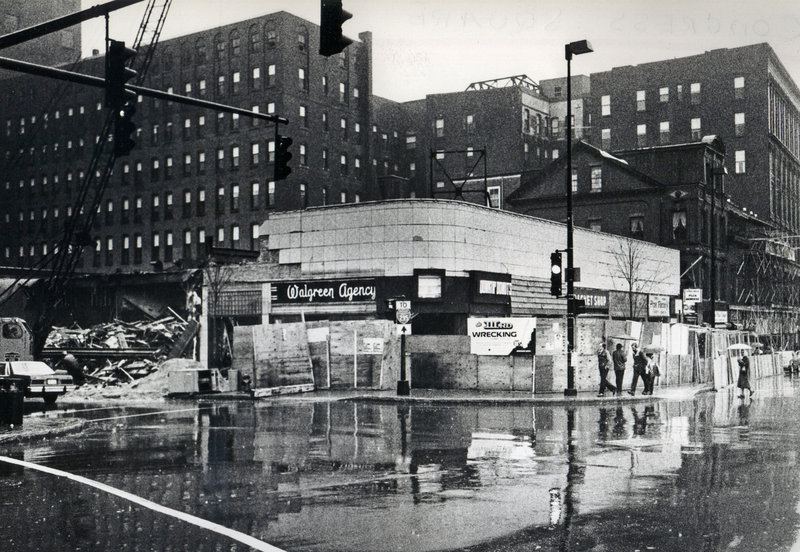PORTLAND – When the City Council meets Monday to decide whether to sell a section of Congress Square Plaza to an out-of-state developer, many observers will see more at stake than the plaza’s fate.
Those with opposing views see the deal for the nearly half-acre concrete plaza at Congress and High streets as either a symbol of all that’s wrong in the world or an opportunity to bolster Portland’s economy.
The debate is about gentrification — sweeping homeless people (or people who appear homeless) out of view to make way for a shiny building and affluent people.
It’s about preserving a public space for civic discourse and maintaining Portland’s history of creating and valuing open spaces.
It’s about economic development, turning a liability into a tax-producing asset that provides jobs.
For the more radical factions, like the handful of remaining Occupy Maine members, it’s about corporate welfare and corporate domination of working men and women. It’s about backroom deals, perceived corrupt politicians and even the subversion of democracy.
All of that has led to shouting matches, public demonstrations and an attempt to start a petition drive.
But it all begs the question: What is really going on?
“I just can’t seem to get my arms around it,” said Cheryl Leeman, one of two city councilors who say they are undecided on the deal. “Something has gone amok.”
The other undecided councilor, Jill Duson, who is up for re-election in November, did not return a call for comment.
COMPLAINTS OF FAULTY PROCESS
The council is expected to vote Monday on whether to sell two-thirds of Congress Square Plaza to Ohio-based Rockbridge Capital. The developer wants to build a single-story event center there as an addition to the former Eastland Park Hotel, which it is renovating. The deal would leave 4,800 square feet for a new public plaza.
The dispute appears to be centered on process — too much process for supporters of the sale, not enough for opponents, and not the right kind of process for independent observers.
For years, the city has been studying ways to fix what most agree is a failed, underused public space.
Rockbridge Capital ran into opposition last year when it presented a plan to develop the entire plaza. It returned this spring with a scaled-down proposal.
Bruce Wennerstrom, who has been representing the developer in its negotiations with the city, says he has held meetings with about 30 residents, neighborhood groups and professional associations.
“In my opinion, it has been a very thorough and complete process, giving everyone a chance to weigh in,” said Wennerstrom, who will manage the renovated hotel when it reopens in December as the Westin Portland Harborview Hotel. “Now it’s time to vote and move on.”
Opponents, however, criticize a series of closed-door meetings between the developer and the council’s Housing and Community Development Committee to negotiate the sale. When an agreement was reached, the committee quickly recommended passage to the council. The agreement sets an aggressive timeline for the project to move forward.
Frank Turek, president of the Friends of Congress Square Park, a nonprofit group that opposes the sale, says a community-led process that concluded the downtown space should be redesigned entirely was usurped.
The city was prepared to spend $50,000 to redesign the plaza, but withheld the call for proposals when Rockbridge Capital bought the adjacent hotel. City officials have acknowledged that they approached the company to ask whether it was interested in developing the space.
“With Congress Square Park, there has never been any indication that the city had a desire to be rid of the property,” Turek said. “It was never anyone’s intention to sell the park until Rockbridge came on the scene.”
Turek says the sale will set a precedent for selling other public spaces in favor of development.
ROOT CAUSES OF OPPOSITION
Jack Kartez, a professor of community planning and development at the University of Southern Maine’s Muskie School of Public Service, said it’s important to have the right type of process — one that genuinely engages all stakeholders, whether they’re developers, residents or business owners.
“There’s a very complex constituency downtown,” Kartez said.
In addition to merchants and students downtown, there are many people who rely on public assistance and spend their time on the street.
Many elderly and disabled people who live in the Congress Square Plaza apartment complex have testified that the plaza is one of the few places they can congregate.
According to the 2010 census and the 2011 American Communities Survey, nearly 8,400 residents live in neighborhoods — Parkside, West Bayside, the downtown and the West End — around Congress Square.
An average of about 4,000 vehicles a day passed through the intersection of Congress and High streets in 2010, according to data from the Maine Department of Transportation.
Mayor Michael Brennan has said the intersection is a gateway to the city that can shape people’s opinions of Portland as a whole.
Ethan Kent, a representative with the national Project for Public Spaces, a New York-based nonprofit that helps communities create dynamic public spaces, visited Portland in June at the request of the Friends of Congress Square Park.
Kent, a graduate of Bowdoin College in Brunswick, said in an interview that the proposal to sell and develop the plaza has become a flash point because the process began with a specific development proposal, rather than a broad community vision for that corner.
“The current discussion is unfortunately rather divisive — you’re either for it or against it. You can only react to it,” Kent said in June.
Charles Colgan, chairman of the Community Planning and Development Department at the Muskie School of Public Service, said open space takes on a greater significance on Portland’s peninsula, which is heavily developed.
Also, many Mainers have a “longstanding suspicion” of out-of-state companies — let alone a multinational corporation like Rockbridge Capital — coming in and proposing major changes, Colgan said.
“When you combine the normal issues of contested public space with suspicions of out-of-state developers, you get a pretty volatile mixture,” he said.
SITE NOT PUBLIC SPACE UNTIL 1980s
The first building to occupy what is now the plaza was a wooden row house constructed in the mid-19th century, said State Historian Earl Shettleworth. In the 1940s, the wooden row houses were torn down and a Walgreen’s was built. In 1971, Dunkin’ Donuts took over a portion of the space. It quickly became popular with prostitutes and vagrants.
Several years later, the City Council expressed a desire to clean up the area. The council eventually seized the former Dunkin’ Donuts building through eminent domain and razed it. In the early 1980s, the city secured a $7.3 million federal grant to convert the former building site into a plaza.
The city worked with community partners to hold events in the park and provided annual funding, but the events never became self-funding, and by 2002 no funds were allocated to a group that coordinated the events.
In 2008, the Congress Square Redesign Study Group was created. It recommended redesigning the park and keeping it as an open space, before the Rockbridge proposal surfaced.
CORPORATION VS. POOR ‘FRENZY’
Portland, which has a strong Buy Local program, has a penchant for shunning corporations downtown.
When a Hooters restaurant and bar was proposed on Congress Street in 2008, the city nearly passed a hotly debated ordinance that would have banned chain businesses from the downtown.
“You’ve got some people who just want to stick it to ‘the man,’” said Chris O’Neil, who represents the Portland Community Chamber, which supports the sale and redevelopment of Congress Square Plaza. “It’s taken on the trappings of a panic, a mob or a frenzy.”
David Wagner, a professor of social work at USM who opposes the sale, said the issue has become a battle between rich and poor members of society.
He said Congress Square is symbolic of what he sees as the city’s effort to sweep people “who are not aesthetically pleasing” out of the commercial center.
Then there is the “ludicrousness” of the proposed sale price — nearly $524,000 — to a corporation that can afford to pay much more, he said.
“For a number of groups, it has hit a nerve,” said Wagner.
If the council agrees to the sale, the debate is expected to rage on.
The Friends of Congress Square Park hoped to collect signatures for a referendum that would ask voters to make it harder to sell and develop 35 public open spaces, including Congress Square.
On Friday, the city attorney rejected that effort, saying citizens cannot initiate a referendum over fiscal matters, including the sale of real estate.
The Friends of Congress Square Park are considering challenging that decision in court.
Randy Billings can be contacted at 791-6346 or at:
rbillings@pressherald.com
Twitter: @randybillings
Send questions/comments to the editors.







